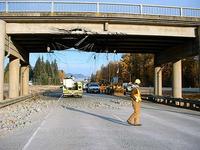-
U.S. unlikely to meet its biofuel goals

The Energy Independence and Security Act of 2007 (EISA) mandates that by 2022 the United States derive fifteen billion gallons per year of ethanol from corn to blend with conventional motor fuels. A new study says that if the climate continues to evolve as predicted by the Intergovernmental Panel on Climate Change, the United States stands little to no chance of satisfying its biofuel goals.
-
-
Government-developed standards not an effective cybersecurity approach: analyst
DHS said the department has “recently learned of a vulnerability that existed in the software used by a DHS vendor to process personnel security investigations.” analyst says that it is bad enough that hackers gained access to the personal information of thousands, but what is even more worrisome is the fact that DHS, with it spotty cyber security record, has been placed in charge of regulating the cybersecurity efforts of critical infrastructure industries.
-
-
Health impact of Chernobyl accident overestimated: study

The impact of the Chernobyl nuclear accident has been seriously overestimated, while unfounded statements presented as scientific facts have been used to strangle the nuclear industry, according to Russian researchers.
-
-
Lawmaker offers a way to finance U.S. infrastructure investment -- with no taxpayers’ money

Representative John Delaney (D-Maryland) says has an answer to the nation’s infrastructure problems, and that it will not cost taxpayers a dime. The money will be raised through the sale of special bonds, not guaranteed by the government, to companies that earn profits outside the United States.
-
-
California Democratic lawmakers want a go-slow approach to fracking
California may be on the verge of an oil rush. It is estimated that hydraulic fracturing, or fracking, at the Monterey Shale formation may tap reserves of fifteen billion barrels of oil. Democratic lawmakers do not see it that way, and have proposed numerous anti-fracking bills aiming to control the use of the controversial technology. Ten bills have been tabled so far, and more are on the way.
-
-
Sandia Lab hosting conversations on engineering
U.S. prosperity depends on effective use of engineering to turn scientific innovation into products that come rapidly to market and increasingly are made in the United States. Sandia Lab has launched a series of conversations a aimed to help identify what the nation’s engineering community can do to make sure technical talent will be available in the future, prepare engineers for the twenty-first century, and secure U.S. leadership in a global economy which is increasingly focused on innovation.
-
-
Chinese government hackers steal designs of advanced U.S. weapons systems
The Chinese government has been conducting a broad, sustained, and disciplined campaign of cyberattacks against U.S. government agencies, critical infrastructure, private companies, and news organizations. The public version of a study prepared for the Pentagon by the Defense Science Board now says that Chinese government hackers have also been able to penetrate the computer networks of all the major U.S. defense contractors, stealing the designs and specifications of the most advanced weapon system in the U.S. arsenal, and gaining insights into broad technologies on which U.S. military advances are based.
-
-
Crowdfunding disaster relief gaining in popularity
A new way to raise funds for disaster victims is gaining in popularity. It is called crowdfunding. The majority of crowdfunding Web sites take a 3 percent to 8 percent cut of the money that is raised — far less than the 25 percent cut most large charities take.
-
-
U.S. infrastructure drops in world infrastructure ranking

The U.S. infrastructure has slipped badly in the world’s infrastructure ranking, both in absolute and relative terms, according to the Global Competitiveness Report for 2012-13, published earlier this month by the World Economic Forum.
-
-
Wind energy in cold-climate countries showing significant potential
Wind energy capacity is growing rapidly in the cold climates of the world. According to the latest forecasts, between 45 and 50 gigawatts of wind energy will be built in cold climates by 2017, which would mean an increase of as much as 72 per cent since the end of 2012 and investments amounting to approximately 75 billion euro.
-
-
Border entry fee opposed by border-state lawmakers, businesses
DHS, in its 2014 budget proposal, asked for permission to conduct a study about imposing fees at U.S. land border crossings. The proposal is bitterly opposed by both businesses on the northern border, which make most of their money from Canadians who cross into the United States just to shop, and lawmakers from states along the U.S.-Canada border, who say such fees will hurt both commerce and relations between the United States and Canada.
-
-
Report: U.S. companies should consider counter-hacking Chinese hackers
A group studying how the United States should respond to the sustained campaign of cyberattacks conducted by Chinese government hackers against U.S. companies, said the United States should seriously consider a campaign of retaliatory cyberattacks against the hackers.
-
-
DHS: it is impossible to stop 3D plastic guns from getting past security checkpoints

A DHS intelligence bulletin starkly warns it may not be possible to stop 3D-printed guns from being made – or from getting past security checkpoints undetected. DHS notes that 3D-printed firearms can be made without serial numbers or unique identifiers, making ballistics testing difficult, and that advancements in technology and decreasing 3D printer costs will mean even more sophisticated printed guns will become easier to acquire.
-
-
GOP lawmakers urge Obama not to link Keystone decision to climate policies
Democrats who are uncomfortable with the Keystone XL pipeline have urged President Obama to consider attaching policies requiring cuts in greenhouse gases emissions to his approval of the project. Republican lawmakers are urging the president not to link approval of Keystone to climate change policies.
-
-
Administration more actively to support expansion of fracking
The Obama administration is leaning toward offering more active support for the expansion hydraulic fracturing, or fracking, despite the opposition of environmental groups.
-
More headlines
The long view
Factories First: Winning the Drone War Before It Starts
Wars are won by factories before they are won on the battlefield,Martin C. Feldmann writes, noting that the United States lacks the manufacturing depth for the coming drone age. Rectifying this situation “will take far more than procurement tweaks,” Feldmann writes. “It demands a national-level, wartime-scale industrial mobilization.”
Trump Is Fast-Tracking New Coal Mines — Even When They Don’t Make Economic Sense
In Appalachian Tennessee, mines shut down and couldn’t pay their debts. Now a new one is opening under the guise of an “energy emergency.”
Smaller Nuclear Reactors Spark Renewed Interest in a Once-Shunned Energy Source
In the past two years, half the states have taken action to promote nuclear power, from creating nuclear task forces to integrating nuclear into long-term energy plans.
